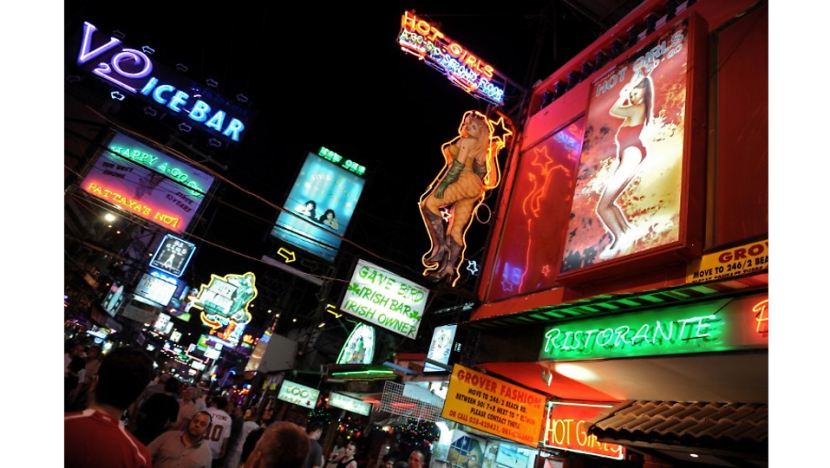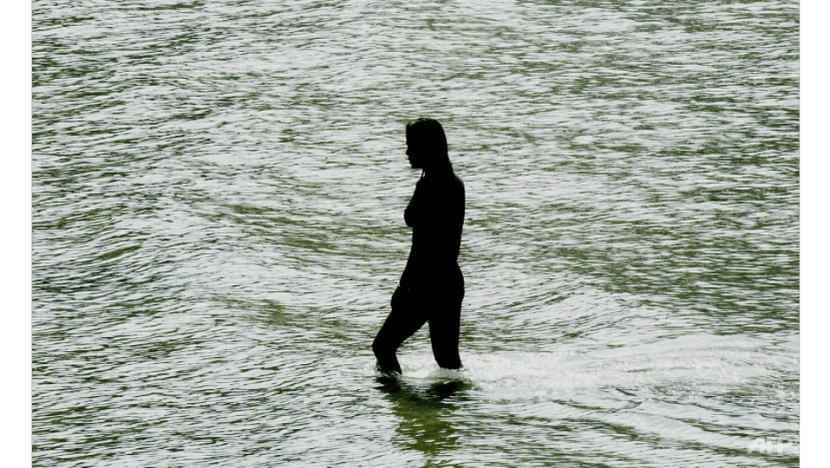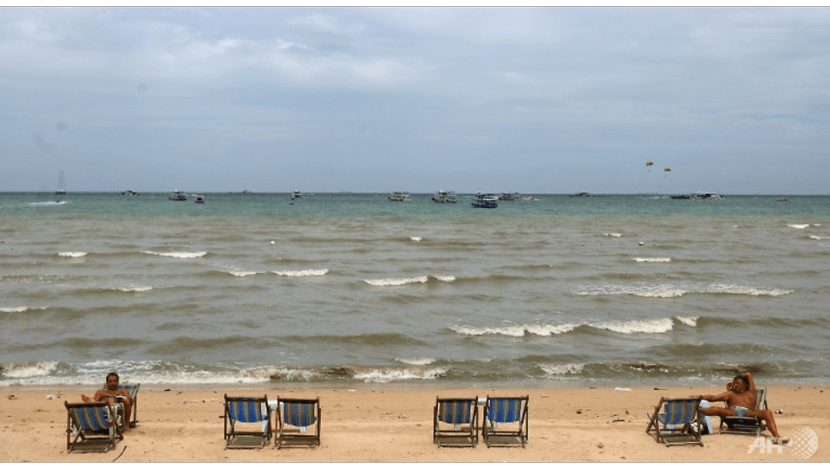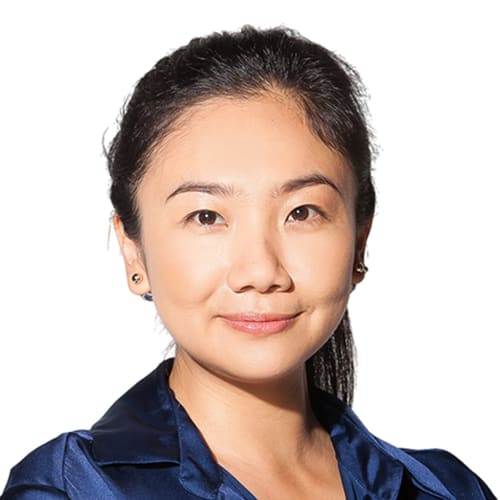'It's normal to be HIV positive': Thai trans women join hands to end AIDS
In Pattaya, a hub for transgender people in Thailand, a community centre has been formed to equip trans people with knowledge about the AIDS epidemic and how to live a good life with HIV. This is a special report for World AIDS Day.

A file photo of a club in the red light district in Pattaya. (Photo: AFP/Nicolas Asfouri)
BANGKOK: When Thailand is mentioned, there are a few notions that often spring to mind. Most likely, one of them would be “lady boys” or transgender women, who have increasingly adopted a dominant role in the Thai society.
Those who have visited the Land of Smiles, particularly its popular beach resort of Pattaya in Chonburi, would know it is not always an easy task to tell if someone is a Thai woman or, in fact, a very beautiful Thai man.
Touted as the Thai capital of trans women, Pattaya is home to some 5,000-6,000 transgender people (TGs), many of them working in its thriving entertainment industry, where sex tourism and prevalence of HIV (Human Immunodeficiency Virus) infection exist side by side.
Still, knowledge of HIV remains limited among TGs, so are counselling services that specifically addresses physical and psychological issues often faced by the group.
“Trans people in general face poor emotional wellness and mental health,” said Joe Wong, Programme Manager of the Asia-Pacific Transgender Network (APTN), the first and only regional entity advocating TGs’ rights and legal recognition.
“Transgender people face discrimination, violence and lack of access to appropriate health care. All of these factors contribute to increased vulnerability of transgender people to HIV.”

People walk in the red light district in Pattaya, Chonburi. (Photo: AFP/Nicolas Asfouri)
Seeing the lack of support available, a team of trans women in Pattaya gathered in 2004 to form the Sisters Foundation, Thailand’s first community centre exclusively promoting the well-being of transgender people through education about HIV and related support services.
“The foundation was established to serve as a second home for Thai TGs,” said its director Thitiyanun Nakpor or Doy, a trans woman and activist from the northern province of Chiang Mai.
“A large number of them come to work in Pattaya because there are a lot of pubs, bars and restaurants here, not to mention many famous cabaret shows. So, we thought there should be some sort of refuge for TGs here,” the 35-year-old added.
"On the occasion of World AIDS Day 2015, I want to highlight our slogan: 'Normal HIV'. Our message is that it's normal to be HIV positive and that it's not scary to live with HIV."
TRANSGENDER AT HIGHEST RISK FOR HIV
In 2014, 36.9 million people across the world were living with HIV, according to the Joint United Nations Programme for HIV and AIDS’ (UNAIDS). Of that number, some 660,000 lived in Indonesia and 450,000 in Thailand, making them the two countries in Southeast Asia with the highest numbers of HIV-infected persons.
In the same year, UNAIDS described HIV prevalence among TGs in Chonburi as “high” at 12.7 per cent, with urban and young men who have sex with men considered “at highest risk” for HIV infection.
“Inequities can persist when essential services don’t reach the people in need,” said UNAIDS Executive Director and Under-Secretary-General of the United Nations Michel Sidibe in his remarks for this year’s World AIDS Day.
“To change this dynamic, we must quicken the pace of action. We know that strengthening local services to reach key populations will lead to healthier and more resilient societies,” he added.

A file photo shows a person on a beach in Pattaya. (Photo: AFP/Saeed Khan)
Since its establishment, the Sisters Foundation has strived to raise the awareness of HIV infection and its most advanced stage called AIDS (Acquired Immune Deficiency Syndrome), where the body is unable to fight off infections or cancer.
Besides fighting the epidemic, its 16 staff – most of them trans women – also tackle other issues commonly faced by Thai TGs, from side effects of hormone replacement therapy to social discrimination.
“There is no governmental body that provides such assistance for TGs in Thailand. That’s why our foundation strives to serve as a centre of excellence for them,” Doy said.
With support from USAID – a US Government agency that works to enable resilient societies to realise their potential – the community centre offers free HIV tests that produce a result within 45 minutes.
It also works with the Thai Red Cross and local hospitals, and carries out weekly fieldwork, where staff members travel across Pattaya to meet and educate transgender people about HIV.
"Our fieldwork is based on a concept called RRTTR: Reach, Recruit, Test, Treat and Retrain," Doy explained.
“We reach out to transgender people who we think are prone to contracting HIV. We’ll then recruit them for an HIV test. If they are HIV positive, we'll treat them while retaining the virus.”
END AIDS BY 2030
In a global battle against AIDS, the member states of the United Nations pledged in September to end the epidemic by 2030.
Its advocate UNAIDS also developed the Fast-Track Strategy for world leaders to achieve their ambitious goal, where nearly 28 million new HIV infections and 21 million AIDS-related deaths would be averted.

Tourists relax on a beach in Pattaya, east of Bangkok. (AFP/Indranil Mukherjee)
The approach comes with a set of targets to be reached by 2020 such as achieving zero discrimination and ensuring 90 per cent of people who know their status have access to treatment.
“Now we have five years to break it for good or risk the epidemic rebounding out of control,” Mr Sidibe said.
At present, more than 17 million people do not know they are infected by the virus, while 22 million HIV positive persons lack access to medical treatment.
In November, Thailand unveiled its first clinic that exclusively treats transgender people, the Tangerine Community Health Centre.
“This is an immense step for Thailand and the region regarding the mobilisation and advocacy for transgender health,” said Nicha Rongram, communications director at the Thai Transgender Alliance for Human Rights.
Located within the Thai Red Cross AIDS Research Centre in Bangkok, the clinic provides TGs with a wide range of services, including psychosocial counselling, hormone administration and pap smears.
“We are committed to provide the highest attainable standard of health in an affordable and accessible manner for all transgender people, with respect to their rights to health and human dignity,” said Prof Emeritus Praphan Phanughak, Director of the Thai Red Cross AIDS Research Centre.
The opening of the clinic was welcomed by activists such as Doy, who continues to fight for the well-being of TGs in Thailand.
“The centre’s mission is not only to reduce HIV infections in the transgender community but also to ensure that its members, HIV positive or not, enjoy a good life free from social stigma and violence."














